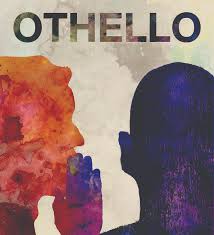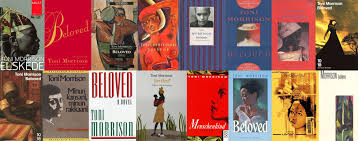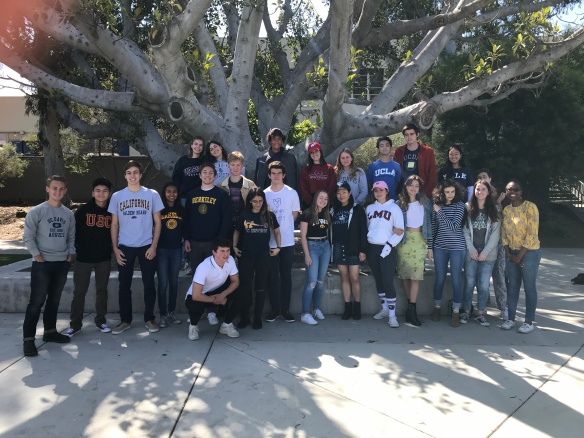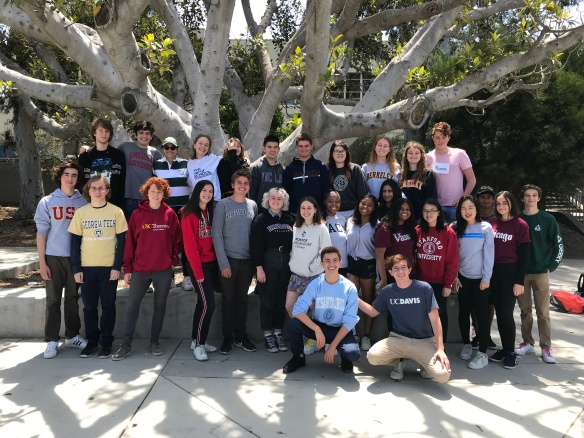Dear 12AP Students,
I want to begin by wishing you a Happy New Year! When I was a kid, 2020 sounded like some Sci-Fi distance in the future—but here we are. I hope that you have been enjoying your break and getting some time to restore.
Below you will see the list of outside reading books you may choose from. Once you do your research and peruse a few authors and pages, please feel free to email me your first and second choice. You will have until Friday, January 10th, to make your final decisions. Once your book has been recorded, you will have the opportunity to prepare individually or within a group that has chosen the same book. Book conferences will begin on Monday, February 10th, and will end on Friday, February 21st.
Feel free to email me with any questions or if you want me to make some individual suggestions for you.
- The Age of Innocence by Edith Wharton
- All the Light We Cannot See by Anthony Doerr
- All the Pretty Horses by Cormac McCarthy
- The Amazing Adventures of Kavalier & Clay by Michael Chabon
- American Pastoral by Philip Roth
- Atonement by Ian McEwan
- Blindness by José Saramago
- Brave New World by Aldous Huxley
- Catch-22 by Joseph Heller
- The God of Small Things by Arundhati Roy
- The Goldfinch by Donna Tartt
- Great Expectations by Charles Dickens
- The Grapes of Wrath by John Steinbeck
- Invisible Man by Ralph Ellison
- Jazz by Toni Morrison
- The Known World by Edward P. Jones
- Light in August by William Faulkner
- Middlesex by Jeffrey Eugenides
- The Namesake by Jhumpa Lahiri
- One Flew Over the Cuckoo’s Nest by Ken Kesey
- The Orphan Master’s Son by Adam Johnson
- The Picture of Dorian Gray by Oscar Wilde
- The Portrait of a Lady by Henry James
- The Rainbow by D.H. Lawrence
- Song of Solomon by Toni Morrison
- The Sympathizer by Viet Thanh Nguyen
- A Tale of Two Cities by Charles Dickens
- To the Lighthouse by Virginia Woolf
- Things Fall Apart by Chinua Achebe
- White Noise by Don DeLillo
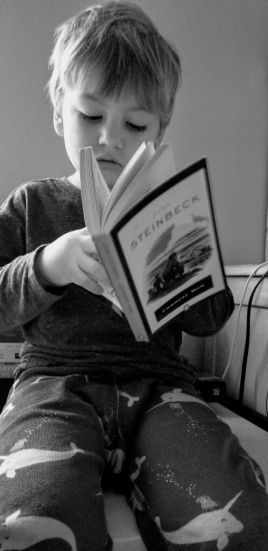
Due Monday (tomorrow), November 25th: The Tempest, Act II
AND
Due Wednesday, December 4th: Ceremony / There There Paper
AP Literature (Barraza)
Fall 2019-2020
Ceremony / There There
Final Essay Questions (Choose One): Due Wednesday, December 4th.
Basic Directions: Strong, defensible thesis that is clear and well-constructed; 3-5 pages double-spaced and adhering to MLA guidelines. Essay must be balanced: voice; textual evidence; and strong analytical commentary. Your line of reasoning should be intentional and clear to the reader. Stay away from circular reasoning and take analytical risks that stem from your close reading of the text.
Essay Topics to Consider for: There There
- “And, after all, our surroundings influence our lives and characters as much as fate, destiny or any supernatural agency.” Pauline Hopkins, Contending Forces
Consider the cultural, physical, or geographical surroundings that help to shape the psychological or moral traits found in There There’s characters. Then, write a well-organized essay in which you analyze how surroundings affect a particular character (or characters) and how that relationship between surrounding(s) and character(s) illuminates the meaning of the work as a whole.
- Discuss the development of the “Urban Indian” identity and ownership of that label. How does it relate to the push for assimilation by the United States government? How do the characters in There There navigate this modern form of identity alongside their ancestral roots?
- Consider the following statement: “We stayed because the city sounds like a war, and you can’t leave a war once you’ve been, you can only keep it at bay” (9). In what ways does the historical precedent for violent removal of Native populations filter into the modern era? How does violence—both internal and external—appear throughout the narrative?
- Early in the novel, Orange states, “We’ve been defined by everyone else and continue to be slandered despite easy-to-look-up-on-the-internet facts about the realities of our histories and current state as a people” (7). Discuss this statement in relation to how Native populations have been defined in popular culture. How do the characters in There There resist the simplification and flattening of their cultural identity? Relate the idea of preserving cultural identity to Dene Oxendene’s storytelling mission.
- Tony Loneman’s perspective both opens and closes There There. Why do you think Orange made this choice for the narrative? What does Loneman’s perspective reveal about the “Urban Indian” identity? About the landscape of Oakland?
- Opal’s mother tells her that she needs to honor her people “by living right, by telling our stories. [That] the world was made of stories, nothing else, and stories about stories” (58). How does this emphasis on storytelling function throughout There There? Consider the relationship between storytelling and power. How does storytelling allow for diverse narratives to emerge? What is the relationship between storytelling and historical memory?
- Edwin Black asserts, “The problem with Indigenous art in general is that it’s stuck in the past” (77). How does the tension between modernity and tradition emerge throughout the narrative? Which characters seek to find a balance between honoring the past and looking toward the future? When is the attempt to do so successful?
- How is the city of Oakland characterized in the novel? How does the city’s gentrification affect the novel’s characters? Their attitudes toward home and stability?
- How is femininity depicted in There There? What roles do the female characters assume in their community? Within their families?
- One of the strongest human drives seems to be a desire for power. Write an essay in which you discuss how a particular character (or set of characters) in There There struggles to free himself or herself from the power of others or seeks to gain power over others. Be sure to demonstrate in your essay how the author uses this power struggle to enhance the meaning of the work.
Essay Topics to Consider for Ceremony:
- One of the strongest human drives seems to be a desire for power. Write an essay in which you discuss how a character in Ceremony struggles to free himself or herself from the power of others or seeks to gain power over others. Be sure to demonstrate in your essay how the author uses this power struggle to enhance the meaning of the work
- Many writers use a country setting to establish values within a work of literature. For example, the country may be a place of virtue and peace or one of primitivism and ignorance. Discuss how the setting in Ceremony plays a significant role. Then write an essay in which you analyze how the country setting functions in the work as a whole.
- “And, after all, our surroundings influence our lives and characters as much as fate, destiny or any supernatural agency.” Pauline Hopkins, Contending Forces
Consider the cultural, physical, or geographical surroundings that help to shape the psychological or moral traits found in Ceremony’s characters. Then, write a well-organized essay in which you analyze how surroundings affect a particular character (or characters) and how that relationship between surrounding(s) and character(s) illuminates the meaning of the work as a whole.
- The eighteenth-century British novelist Laurence Sterne wrote, “No body, but he who has felt it, can conceive what a plaguing thing it is to have a man’s mind torn asunder by two projects of equal strength, both obstinately pulling in a contrary direction at the same time.”
Choose a character from Ceremony (not necessarily Tayo) whose mind is pulled in conflicting directions by two compelling desires, ambitions, obligations, or influences. Then, in a well-organized essay, identify each of the two conflicting forces and explain how this conflict within this character illuminates the meaning of the work as a whole.
- Novels and plays often depict characters caught between colliding cultures—national, regional, ethnic, religious, institutional. Such collisions can call a character’s sense of identity into question. Choose a character responds to such a cultural collision. Then write a well-organized essay in which you describe the character’s response and explain its relevance to the work as a whole.
Reading Due:
Friday, 11/8: Pages 3-44
Wednesday, 11/13: Pages 45-155 (Completion of Part I & II)
Thursday, 11/14 : Pages 156-186
Friday, 11/15: Pages 187-225 (Completion of Part III)
Monday, 11/18: Pages 226-290 (Completion of novel)
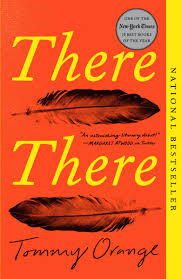
Please take notes for each chapter in order to identify particular patterns in the writing. This will fortify that you will be prepared for class discussions and writing tasks connected to the novel.
12AP Literature & Composition
Fall 2019-2020
Choose one of the following prompts as your final response to Toni Morrison’s Beloved. The essay and the reading of the accompanying literary criticism will be due on Thursday, October 3rd. Your essay should result in a 4-6-page paper utilizing textual evidence in line with proper MLA format. Please do not submit a paper that results in simple summary. Your task is to make some critical argument via textual evidence and sophisticated reasoning. I encourage you to use at least one of the pieces of literary criticism in your essay. Please note that you are required to read all three, even if you choose not to use any in your essay. On Thursday, October 3rd, I will ask you to respond to a handful of questions stemming from the three pieces of literary criticism. The essays are accessible via the links at the end of this post.
Essay Choices:
- So much of this novel is rooted in the unfortunate truth that slavery dehumanizes individuals by stripping them of their identity, destroying their ability to conceive of the self. Morrison combines the psychological and cultural aspects of the black community and explores the issues of identity, family, and self-possession in a world where slavery has apparently become an unfortunate issue of the past, but emerges, throughout, as a haunting presence. Consider how characters in the novel contend with the past, either personal or societal. Then, write an essay in which you show how the relationship to the past contributes to the meaning of the work as a whole.
- How does motherhood get displayed in this novel?
- How does love get measured and defined in this novel?
- Discuss the different roles of the community in betraying and protecting the house at 124. What larger issue might Morrison be suggesting here about community?
- In what ways can this novel be read as history?
- “This is not a story to pass on” (275). Discuss how this warning by the narrator at the end illuminates the novel as a whole.
- What is the significance of the elements and effects of the novel’s structure?You might want to consider: oral tradition; flashbacks & time shifts; magical realism; stream of consciousness; and the novel as a bildungsroman.
- In what way is the novel structured in a musical, compositional, or symphonic way? Should you choose to answer this question, please note that the novel must be the root and the river of the paper, meaning that the text should drive the analytical conversation, regardless of the music-related sources you might choose to utilize.
- Although we have to some degree answered this question prior to completing the novel, feel free to answer it again, this time with more fullness and sophistication: “Who or what is Beloved?” (Don’t make this question your title, however.)
- As an opportunity to validate your own reading and critical engagement of this novel, consider the findings or contemporary connections you’ve been able to make. Write an argumentative essay that derives from your own critical attention to a particular aspect (or aspects) of the novel.
A Final Note: Papers must move beyond simple summary. The key to your success with this paper is having a clear purpose in your argument. Remember, content and form matter; thus, your paper should be organized, cogent, analytically developed, balanced, full, and clean in terms of mechanics and syntax. Please note that any papers plagiarizing external sources will result in a 0 grade.
Required Literary Criticism:
1–“To Be Loved-Amy Denver and Human Need-Bridges to Understanding in Toni Morrison’s Beloved”
2-“The Ghost of Slavery- Historical Recovery in Toni Morrison’s Beloved”
3-“A Love Supreme- Jazzthetic Strategies in Toni Morrison’s Beloved”
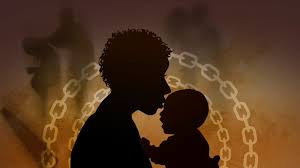
Writing Assignment (typed) Due Monday, 9/16:
A symbol is an object, action, or event that represents something or that creates a range of associations beyond itself. In literary works a symbol can express an idea, clarify meaning, or enlarge literal meaning.
Focusing on one symbol found in your reading of Beloved, write a short essay analyzing how that symbol functions in the work up to this point and what it reveals about the characters or themes. Do not merely summarize the plot.
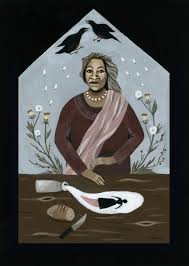
Beloved Reading Due:
Monday, 9/16: Sections 19 & 20
Tuesday, 9/17: FLEX TIME (No Class)
Wednesday, 9/18: Sections 21-25 (End of Part Two of the novel)
Thursday, 9/19: Preparation for AP Timed Writing #1 (Poetry)
Friday, 9/20: Timed Writing #1 (Poetry)
Monday, 9/23: Sections 26-28 (Completion of novel); Culminating paper on Beloved assigned assigned
—————————————————————————————————
Outside Reading:
The Bluest Eye & The Piano Lesson Due Tuesday, 10/1
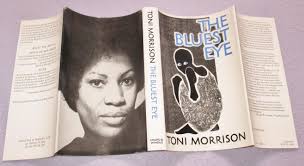
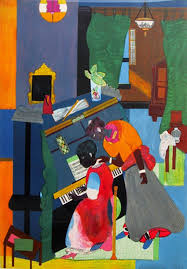
Dear 12AP Students,
To recap, we discussed sections 2 & 3 on Thursday, September 5th, and sections 4-6 on Friday, September 6th. Remember, it is crucial to your reading of Beloved that you continue to prepare questions for our discussions. Thank you for the investment you’ve shown as a class in these first few weeks of the semester.
Due on:
Monday, September 9th: sections 7, 8 & 9
Tuesday, September 10th (No class due to Flex Schedule: Periods 1/3/5
Wednesday, September 11th: sections 10-13
Thursday, September 12th: sections 14-16
Friday, September 13th: sections 17-18
Dear 12AP Students,
It’s been a pleasure starting the year with all of you. As mentioned in class, you will begin reading from the Perrine’s Literature book. Please complete Chapter One (“What Is Poetry?”) prior’s to Wednesday’s class: Pages 680-698 (As you move through the chapter, keep a few notes, particularly in response to the poems, that propel inquiry and reflect careful observation). Please note that you are not required to answer any of the questions in the chapter at this point.
During the Flex Period on Tuesday, August 27th, the substitute is likely to utilize most of the class time. However, should there be extra time, please begin reading Chapter Two (“Reading the Poem”) on page 699, as the entire chapter will be due on Friday (pages 699-719).
*Please note that we will spend the first half of class on Wednesday, Thursday, and Friday discussing Othello.
Candide by Voltaire (Candide, Pangloss, Cunégonde, Cacambo, etc.)
A Confederacy of Dunces by John Kennedy Toole (Ignatius Riley, Irene Reilly, Myrna Minkoff, Lana Lee, Burma Jones, Santa Battaglia, Gus Levy, Angelo Mancuso, Claude Robichaux, etc.)
A Street Car Named Desire by Tennessee Williams (Stanley Kowalski, Stella Kowalski, Blanche, Harold “Mitch” Mitchell, etc.)
The Glass Menagerie by Tennessee Williams (Tom Wingfield, Laura Wingfield [Tom’s sister], Amanda Winfield [Tom’s mother], Jim O’Connor)
The Importance of Being Earnest by Oscar Wilde (John “Jack” Worthing, Algermon Moncrieff, Brackpool, Lady Augusta Bracknell, etc.)
The Sound and the Fury by William Faulkner (Caddy, Jason, Benjamin, Caddy, Quintin Compson; Dilsey Gibson; Caroline Bascomb Compson [mother] and Jason Compson [father]; Miss Quentin Compson, etc.)
Beloved by Toni Morrison (Sethe, Denver, Paul D., Baby Suggs, Halle, Beloved, Stamp Paid, Ella, Lady Jones, Schoolteacher, Mr. & Mrs. Garner, Mr. & Miss Bodwin, etc.)
The Pastures of Heaven by John Steinbeck (short story cycle; thus, it’s best not to use this for a response)
The Grapes of Wrath by John Steinbeck [play version; should you write about this text, refer to it as a novel] (Tom Joad, Ma Joad, Pa Joad, Reverend Jim Casy, etc.)
East of Eden by John Steinbeck (All the Trasks [Cyrus, Adam, Charles, Cal, Aron], all the Hamiltons, Cathy Ames, Lee, etc.)
Chronicle of a Death Foretold by Gabriel García Márquez (Santiago Nasar, Angela Vicario, Pablo & Pedro Vicario, Bayardo San Roman, Colonel Aponte, etc.)
One Hundred Years of Solitude by Gabriel García Márquez (Check the genealogy; Jose Arcadio Buendia, Ursual Iguaran, Colonel Aureliano Buendia, Aureliano Jose, Amaranta, Rebeca, Remedios Moscote, etc.)
Ceremony by Leslie Marmon Silko (Tayo, Josiah, Harley, Rocky, Grandma, Auntie, Betonie [medicine man who guides Tayo], Night Swan, etc.)
Hamlet by William Shakespeare (Hamlet, Ophelia, Gertrude, Claudius, Polonius, Laertes, Fortinbras, Rosencrantz & Guildenstern, etc.)







